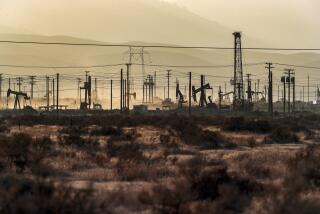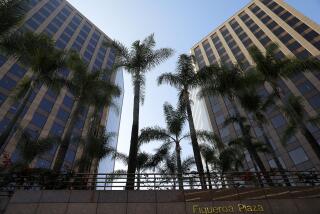Energy Panel Chief Says Plant Backers Misuse Letter
State Energy Commissioner Charles Imbrecht said Tuesday that he was âdismayed and offendedâ to discover that a letter he wrote last year had been âmischaracterizedâ in an effort to sell $395 million in bonds for an Irwindale trash-to-energy project and to promote a stock offering. Imbrecht is chairman of the commission, which must decide whether to license the project.
Imbrecht said he wrote the letter to help Pacific Waste Management Corp. and the City of Irwindale obtain financing for the project. He said the projectâs promoters said a letter from him would have âsome significance for the financial viability of the project,â and he did not want to see the project stopped for lack of financing. But he said he never intended to offer assurances that the plant would be licensed.
Nevertheless, attorneys for Miller Brewing Co., which opposes the project, said Imbrecht showed partiality to the project by the letter and should disqualify himself from commission proceedings on the Irwindale proposal. Imbrecht said he is notifying Miller attorneys that their request has been rejected.
Terry O. Kelly, an attorney representing Miller, said the next step will be to ask the five-member Energy Commission or the site committee hearing the Irwindale project to disqualify Imbrecht, and, if that fails, take the issue to court.
In the disputed letter, dated Sept. 24, 1984, Imbrecht said that if information supplied to him about the project was correct, âwe have no reason at this time to believe that the project will not be found in compliance with California law and, thus, that the requisite permits for the operation of the project will be granted.â
âStatement Is Qualifiedâ
The letter concluded: âNotwithstanding the foregoing, however, this statement is qualified in its entirety by the final decision of the commission, and by additional matters, such as changes in legal or environmental circumstances which may occur.â
Imbrecht said the first draft of his letter was prepared by the projectâs bond counsel, but that he made significant changes in the language to avoid prejudging the matter. âI was more than adequately careful,â he said.
His intent in issuing the letter, he said, was to keep the Irwindale project alive for consideration, not to guarantee its passage through the Energy Commission, which has primary licensing authority for large-scale power projects. The proposed Irwindale plant would burn 3,000 tons of trash a day to generate enough electricity to serve 40,000 homes.
Imbrecht said he issued the letter at the request of Michael Montgomery, attorney for Pacific Waste and a stockholder in its parent company, Conversion Industries Inc. Imbrecht is a former Republican assemblyman from Ventura. Montgomery, former Republican Party state chairman, is a member of the state Fair Political Practices Commission.
$395 Million in Bonds
Montgomery is also a former redevelopment attorney for the city of Irwindale, which created the Irwindale Resource Recovery Authority to sell $395 million in bonds to finance the trash-to-energy plant.
Imbrecht said it was not until last week that he learned that the official bond statement on the project characterized his letter as an Energy Commission âpreliminary opinionâ that indicated that the project âis expected to meet all permit requirements.â
The same statement is contained in a prospectus prepared by Conversion Industries to sell 300,000 shares of stock in Canada. The prospectus issued in the United States contains a similar statement but adds the phrase âno assurance can be givenâ that the Energy Commission will issue a permit to build the Irwindale plant.
Imbrecht said his letter was not a preliminary opinion and he has no idea whether the project will be licensed. He said he thought his letter would be used in bond documents in its entirety, with all of its qualifications, and was surprised to find that it had been summarized in what he called a misleading way.
The Irwindale Resource Recovery Authority sold the bonds in December, 1984. According to a prospectus issued by Conversion Industries, the money raised by the bond sale has been reinvested at a higher interest rate, which is expected to yield about $15 million in revenue in the first 18 months of the issue.
Most of the funds are tied up by the reinvestment, but the $15 million is available to pay legal fees, financial consultants, technical experts and others involved in the project.
Nearly $500,000 will go to Charles Martin, who earns $100,000 a year as part-time city manager and city attorney of Irwindale. Martin said his fee was earned by representing the Irwindale Resource Recovery Authority on the bond issue and is a smaller percentage of the bond issue than he usually charges for his services.
Legal fees for bond issues are comparatively high, Martin said, because the work is done on a contingency basis--if the bonds are not sold, the fees are not paid.
Martin noted that critics have objected to the arrangement on grounds that his advice to the city to proceed with the project could be influenced by his own financial gain. But, Martin said, any time a city attorney advises a client to proceed with a lawsuit--at the cost of additional legal fees--there is a comparable conflict of interest, which the state Fair Political Practices Commission has said is permissible.
Martin said the Irwindale City Council committed itself to the project in May of last year and he was not hired to do the bond work until months after the commitment was made.
City Councilman Michael Miranda said he saw no conflict of interest. He said Martin in the past has advised the city against bond issues despite the fact that he could have profited from legal fees if the bonds had been issued.
Other city attorneys said it is not unusual for a city attorney to receive a percentage of a bond issue for legal services. But what is unusual in this case is that Martinâs fee is being paid in installments under a contract with Pacific Waste Management Corp. He received $123,437 in January and is to receive the same amount each Jan. 20 through 1988.
Martin said he agreed to stretch out his payments to assist the project, but that he has earned the money, is under no obligation to Pacific Waste and will collect from the city if Pacific Waste does not pay.
But Dennis Enright, the financial consultant on the bond issue and a director of Pacific Waste, said Martinâs payments through Pacific Waste will stop if the trash-to-energy project does not go forward. If the project is not licensed by the state, he said, the bonds will be retired and there will be no money to pay the obligation to Martin.
Martin is receiving the same compensation as Montgomery, who represented Pacific Waste in the bond issue. The lead bond counsel, the law firm of Mudge, Rose, Guthrie, Alexander & Ferdon, received $400,000, according to Enright.
Documents filed with the U.S. Securities and Exchange Commission by Conversion Industries show that Enright was paid $392,500 in connection with the bond issue and is owed an additional $101,250.
The stock prospectus issued by Conversion Industries in Canada last month and documents filed with the Securities and Exchange Commission identify the major stockholders and officers of the company and its subsidiaries as John P. McGrain, 39, of Sierra Madre; Harold Charles Moll, 49, and Donald Grant Macdonald, 49, both of West Vancouver, Canada; Logan Bruce Anderson, 30, of Vancouver, Canada; Laurence Peck, 42, of Corona del Mar; Georgette Williams Pagano, 27, of Encino; Enright, 37, of Jersey City, N.J., and Montgomery, 48, of San Marino.
McGrain, who has been in the securities business since 1969, is president of the parent company and he and Moll are the largest stockholders.
The documents say McGrain was paid $165,000 this year for his services in connection with the Irwindale project and bond offering and is owed an additional $327,000. Moll was paid $165,000 for consulting work for Pacific Waste and an affiliated company. Peck and a company controlled by him received more than $223,000 for various services to Pacific Waste and an affiliate.
The documents describe the principal asset of Conversion Industries as its interest in the Irwindale waste-to-energy project. But the documents note that the company has not yet reached agreement with cities and trash haulers to supply waste for the plant and faces many hurdles before obtaining state and federal authorization to build and operate it.
The project has drawn opposition from Rep. David Dreier (R-La Verne), West Covina Mayor Forest Tennant and a number of other local political leaders who say the air pollution produced by burning the trash could exacerbate the areaâs severe smog problems. Plant proponents say they can offset pollution increases and that burning trash is more environmentally sound than dumping it in a landfill.
Officials of Miller Brewing Co. have said they object to the project because of the possibility it will pollute air and ground water.
Duarte residents opposed to the project will conduct a town meeting at 8 p.m. Aug. 9 at the Duarte Masonic Temple, 1900 E. Huntington Drive.
More to Read
Inside the business of entertainment
The Wide Shot brings you news, analysis and insights on everything from streaming wars to production â and what it all means for the future.
You may occasionally receive promotional content from the Los Angeles Times.










